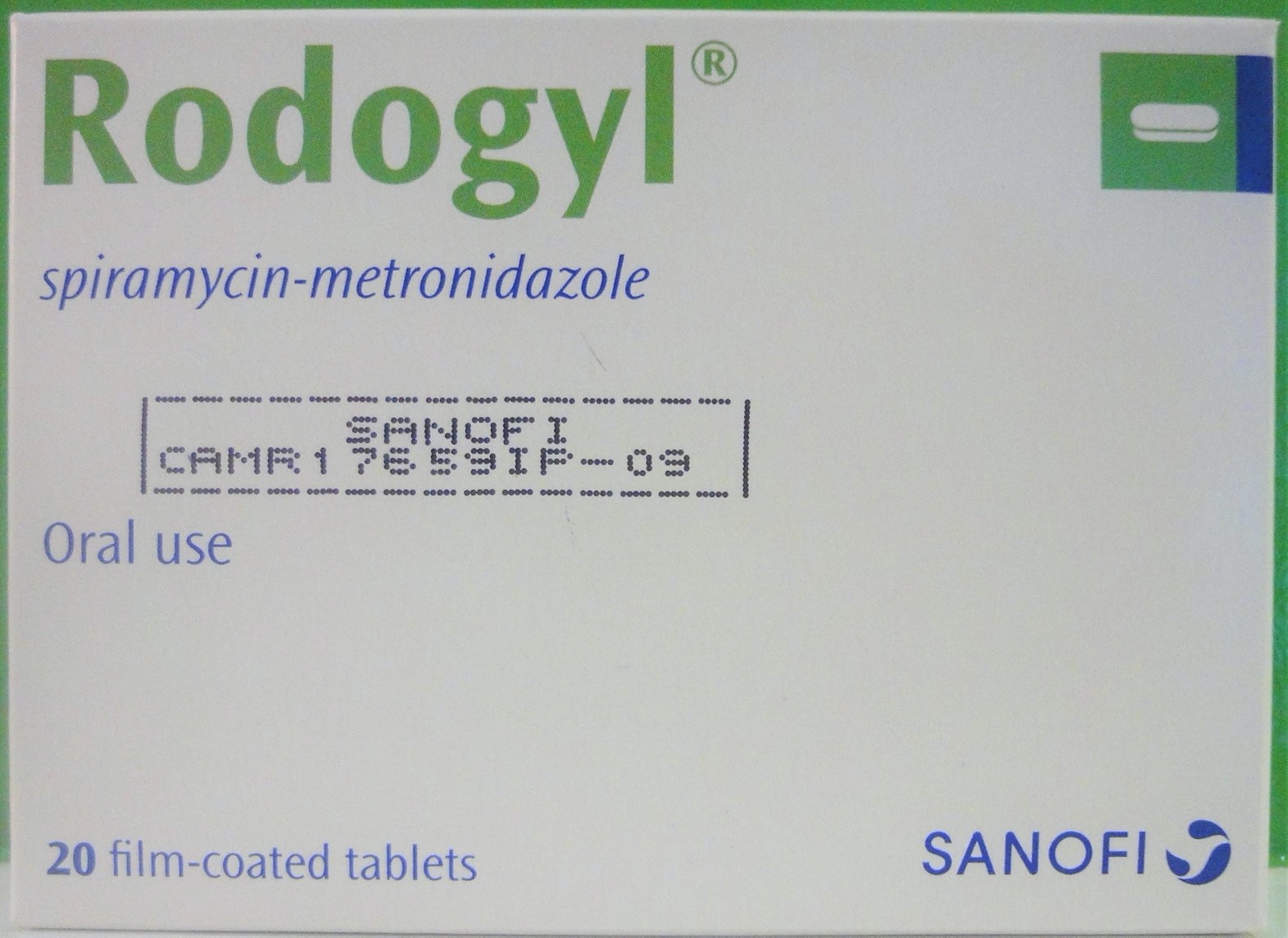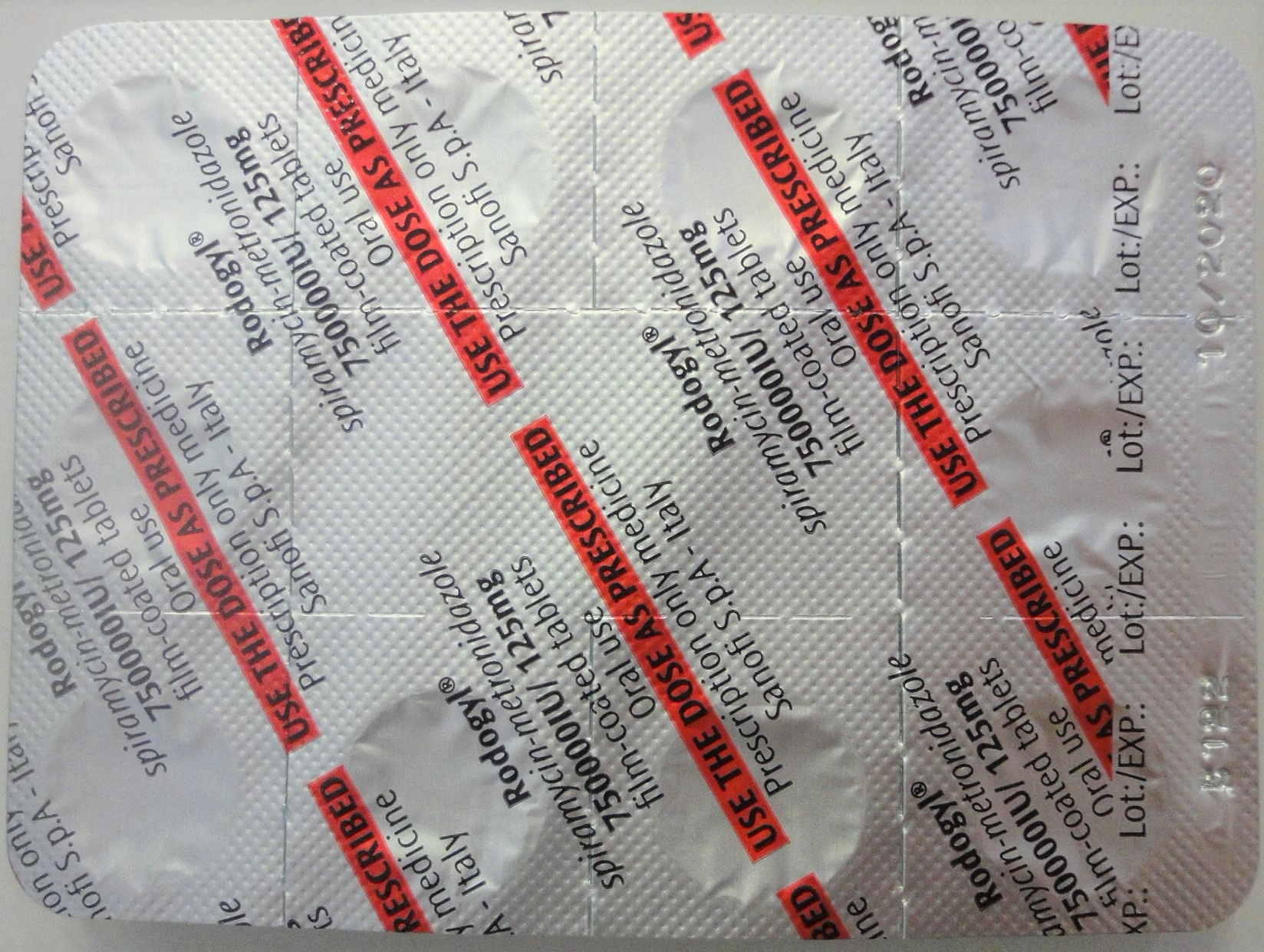RODOGYL Tablet
ក្រុមហ៊ុនផលិតឱសថ:
SANOFI S.P.A., Italy
ក្រុមហ៊ុនចែកចាយឱសថនៅប្រទេសកម្ពុជា:
SANOFI


- សារធាតុសកម្ម
- ប្រសិទ្ធិភាពព្យាបាល និង កម្រិតប្រើប្រាស់
- ហាមប្រើ
- ផលរំខាន
- អន្តរប្រតិកម្ម
- ស្ត្រីមានផ្ទៃពោះ និង ស្ត្រីបំបៅដោះកូន
- ការប្រុងប្រយ័ត្នជាពិសេស
- សកម្មភាពឱសថ បរិយាយប័ណ្ណឱសថ
-
សារធាតុសកម្ម
Spiramycin 750 000IU, Metronidazole 125mg
-
ប្រសិទ្ធិភាពព្យាបាល និង កម្រិតប្រើប្រាស់
The therapeutic indications derive from the antibacterial activity and the pharmacokinetic properties of the medicinal product. They take into account both the clinical studies carried out with this medicinal product and its position in the range of currently available antibacterials.
Curative treatment
The indications are restricted to acute, chronic or recurrent oral infections:
- dental abscess, phlegmon, cellulites of the jaw, pericoronitis,
- gingivitis, stomatitis,
- periodontitis,
- parotitis, submaxillaritis.
Preventive treatment
Preventive treatment of local, postoperative infectious complications following dental and oral surgery. The efficacy of the drug in preventing infectious endocarditis has not been demonstrated. The official recommendations for the appropriate use of antibacterials should be taken into account.
Posology and method of administration
Curative treatment:
ADULTS:
- 4-6 tablets/day in 2-3 doses, during meals (i.e. 3-4.5 MIU of spiramycin and 500-750mg of metronidazole).
- In severe cases, dosage may be increased to 8 tablets a day.
CHILDREN:
- 6-10 years of age: 2 tablets/day (i.e. 1.5MIU of spiramycin and 250mg of metronidazole).
- 10-15 years of age: 3 tablets/day (i.e. 2.25 MIU of spiramycin and 375mg of metronidazole).
Preventive treatment of local, postoperative infectious complications following dental and oral surgery:
ADULTS:
- 4-6 tablets/day in 2-3 doses, during meals.
CHILDREN:
- 6-10 years of age: 2 tablets/day (i.e. 1.5 MIU of spiramycin and 250mg of metronidazole).
- From 10 to 15 years of age: 3 tablets per day (i.e. 2.25 MIU or spiramycin and 375mg of metronidazole).
-
ហាមប្រើ
This medicine must never be used in the following situations:
- hypersensitivity to imidazole, spiramycin and/or any of the excipients,
- children under 6 years of age, due to the pharmaceutical form.
Use of this medicine is generally not recommended in combination with Disulfiram, alcohol and medicinal products containing alcohol.
-
ផលរំខាន
RELATED TO SPIRAMYCIN:
Gastrointestinal tract:
- stomach pain, nausea, vomiting, diarrhea and very rarely pseudomembranous colitis.
Skin and appendages:
- rash, urticaria, pruritus.
- very rarely, angioedema, anaphylactic shock.
- very rare cases of acute generalized exanthematous pustulosis.
Central and peripheral nervous systems:
- occasional and transient paresthesias.
Hepatic symptoms:
- very rare cases of abnormal liver function test results.
Hematological effects:
- very rare cases of hemolytic anemia have been reported.
RELATED TO METRONIDAZOLE:
Gastrointestinal tract:
- benign gastrointestinal disorders (epigastric pain, nausea, vomiting, diarrhea),
- glossitis with a feeling of dry mouth, stomatitis, metallic taste, anorexia,
- exceptionally, pancreatitis which is reversible on treatment discontinuation.
Skin and appendages:
- Flushing, pruritus, rashes, sometimes with fever,
- urticaria, angioedema, exceptionally anaphylactic shock.
Central and peripheral nervous system effects:
- headache,
- peripheral sensory neuropathy,
- seizure, dizziness, ataxia.
Psychiatric disorders:
- confusion, hallucinations.
Hematological effects:
- very rare cases of neutropenia, agranulocytosis and thrombocytopenia.
Hepatic effects:
- very rare cases of reversible liver function disorders and cholestatic hepatitis.
Other:
- urine can appear reddish-brown as water-soluble pigments may be found due to metabolism of the drug.
-
អន្តរប្រតិកម្ម
(See the package insert about the details.)
RELATED TO SPIRAMYCIN:
+ Levodopa (combined with carbidopa)
RELATED TO METRONIDAZOLE:
Inadvisable combinations
+ Disulfiram
+ Alcohol
Combinations requiring precautions for use
+ Oral anticoagulants
Combination to be taken into consideration
+ Fluorouracil
Special INR imbalance-related issues
Numerous cases of increased oral anticoagulant activity have been reported in patients receiving antibiotic therapy. Certain classes of antibiotics are more involved, particularly: fluoroquinolones, macrolides, cyclins, cotrimoxazole, and certain cephalosporins.
Interactions with laboratory tests
Metronidazole can immobilize treponemes and result in false positives in the Nelson test.
-
ស្ត្រីមានផ្ទៃពោះ និង ស្ត្រីបំបៅដោះកូន
Pregnancy
If necessary, this medicinal product can be used during pregnancy, whatever the stage.
METRONIDAZOLE:
Clinically, analysis of a large number of exposed pregnancies apparently showed no specific teratogenic or fetotoxic effects caused by metronidazole. However, only epidemiological studies would make it possible to check that is no risk.
Animal studies have shown no evidence of teratogenic effects with metronidazole.
SPIRAMYCIN:
If necessary, the use of spiramycin can be considered during pregnancy. To date, widespread use of Spiramycin during pregnancy has not shown teratogenic or fetotoxic effects related to this drug.
Lactation
As metronidazole and spiramycin are excreted in breast milk. this drug should not be administered during breast feeding.
-
ការប្រុងប្រយ័ត្នជាពិសេស
Warnings
Acute generalized exanthematous pustulosis should be suspected in patients in whom generalized febrile erythema associated with pustules occurs at the start of treatment; treatment must be discontinued and any further administration of spiramycin, either alone or in combination, is contraindicated.
Alcoholic beverages should be avoided (antabuse effect).
Treatment should be discontinued if ataxia, dizziness or confusion occur.
As this drug contains metronidazole, the risk of exacerbation of the neurological status of patients with severe, chronic or progressive central and peripheral nervous system disorders should be taken into account.
As this drug contains sorbitol, it is contraindicated in patients with fructose intolerance.
Precautions for use
As very rare cases of hemolytic anemia have been reported in patients with glucose-6-phosphate-dehydrogenase deficiency, the use of spiramycin is not recommended in this patient population.
In patients with a history of hematological disorders, and in those receiving high dose and/or prolonged treatment, blood tests should be performed regularly, in particular differential WBC counts.
In patients with leukopenia, continuation of treatment depends on the seriousness of the infection.
During prolonged treatment, patients must be monitored for the appearance of signs suggestive of central or peripheral neurological reactions (paresthesias, ataxia, vertigo, seizure).
-
សកម្មភាពឱសថ
See the package insert about “Spectrum of antimicrobial activity”.
*ព័ត៌មានឱសថត្រូវបានរៀបរៀងដោយ អ៊ីម៉ាតុគឹ មេឌីក (ខេមបូឌា) ដោយផ្អែកលើប្រភពព័ត៌មានខាងក្រោម។ សម្រាប់ព័ត៌មានលម្អិត សូមស្វែងរកនៅក្នុងក្រដាសព័ត៌មាននៃឱសថនីមួយៗ ឬ សាកសួរទៅកាន់ក្រុមហ៊ុនឱសថឬតំណាងចែកចាយនៃឱសថនីមួយៗ។
ប្រភពព័ត៌មាន៖
- ក្រដាសព័ត៌មាននៃឱសថសម្រាប់អ្នកជំនាញវេជ្ជសាស្ត្រដែលប្រើប្រាស់នៅប្រទេសជប៉ុន (Pharmaceutical and Medical Devices Agency, Pmda): https://www.pmda.go.jp
- ព័ត៌មានសង្ខេបនៃឱសថសម្រាប់អ្នកជំងឺដែលប្រើប្រាស់នៅប្រទេសជប៉ុន: http://www.rad-ar.or.jp
